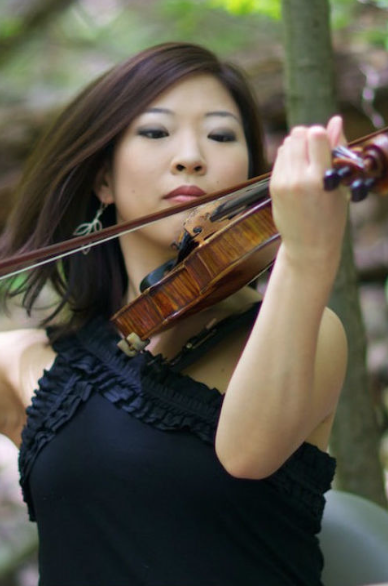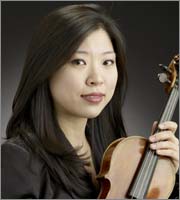by Rory O’Donoghue

Lee will get to flex those elevated chamber music chops this Saturday, August 10 at 8:00 pm at Blossom Music Center, where she will perform Barber’s enigmatic Violin Concerto with The Cleveland Orchestra. I got the chance to catch up with the busy violinist and discuss her upcoming performance.
Rory O’Donoghue: How is your summer going?
Amy Lee: It’s been fun! I have been busy at the Strings Music Festival in Steamboat Springs, Colorado. My whole family came out, and it’s been jam-packed. I’m playing Brandenburgs tonight, and I already played a program of chamber music. We just did the Brahms Clarinet Quintet with Mark Nuccio, principal clarinet of the Houston Symphony — we had a blast. I mean, “blast” is probably the wrong word for that somber piece, but it was a great experience.
RO: And you’ve also been busy with Kent Blossom?
AL: Yes, although I did take a lighter schedule this summer. I didn’t actually perform for once. I worked with a lot of talented young violinists, and it was spectacular.
RO: Of course, the main purpose of this call is the Barber — are you excited?
AL: Right — that’s in a week. I’m very excited. It’s a rare opportunity for me.
RO: Tell me about your relationship with the piece.
AL: This will be my first time performing it, and I only get one chance since it’s a one-off. I learned it in school, and I love the piece. I’m excited that I finally get to really dig into this music and perform it with my incredible orchestra. I feel a certain sense of pride, because Barber studied and taught at the Curtis Institute, my alma mater.
The backstory of this piece — and I’ll keep it short, because it’s messy — is that it was basically rejected by his violinist and his mentor when he wrote it. There were multiple complaints. They thought the last movement was not substantial enough compared to the other two, and that the first two movements don’t exhibit virtuosic violin technique — which I really disagree with. However, Barber must have been completely convinced with what he’d written, because he didn’t revise it much before it was premiered by another violinist. Barber really believed in this piece. You’d think he would feel obligated to appease a violinist of that caliber, and change it, but he said no. He was committed to his version. I think he was right, and I’m glad it survived. It’s one of the staples of the violin repertoire.
RO: Could you walk me through the piece, movement by movement?

RO: That’s so sweet! How different is it to perform with the Orchestra as a soloist rather than as associate concertmaster?
AL: It’s very different. I get to take more personal agency in the performance. In a way, it’s still that same chamber music aesthetic that’s so important and essential to The Cleveland Orchestra’s style of playing. I’m still collaborating in a close, chamber music way — listening, responding, reacting. Physically, it’s a very different orientation, but the same idea of music-making remains. What an honor for me to be able to do this with my colleagues, all of whom I respect so much.
RO: When did you start playing violin?
AL: I started playing violin pretty late. I was ten or eleven, in the fourth grade back in Korea where I grew up. I was studying the piano, but I didn’t care for it much, and I would never practice. One day, my piano teacher said to my mom, “She’s talented, and she needs to keep going with music, but piano just isn’t her thing.” My teacher was going to introduce me to a cello teacher, but my mom didn’t like the idea of lugging around the big cello case, which she would have inevitably carried for me. So violin it was!
I really fell in love with the violin when my parents sent me to Meadowmount a couple years after I started playing. I wrote a letter back to them and said, “I think I’ve found what I want to do with my life!” From then on, I took it seriously. My parents did too. They sent me to Philadelphia the following year, and I enrolled at Curtis when I was 16. That period, the Curtis period, really shaped the musician I am today. My musical values, my love of chamber music — it all formed there. I got my master’s at Juilliard, and then a few months later I was here in Cleveland. I was lucky — the position opened, and Franz and the audition panel decided to take a chance on a young player with no prior professional experience.
RO: Have you soloed with the Orchestra before?
AL: I did the Stravinsky Violin Concerto, but that was a unique setting — I was in the pit at Blossom, and the Joffrey Ballet was onstage. They danced to the entire concerto in the Balanchine version, and it was all done in beautiful black and white staging. I’ve also played Luigi Dallapiccola’s Tartiniana No. 1 with the Orchestra, and I played the Waxman Carmen Fantasy at our community outreach concert in Miami.
RO: What are you looking forward to with this performance?
AL: I get one chance at it — it’s all or nothing. My goal is to fully enjoy the moment. When will I ever get to play such a beautifully colorful piece with such a colorful orchestra again? This piece is all about colors, and I just want to create beauty. I’m going to be so inspired by what I hear and feel from the Orchestra onstage. That’s the moment I’m most excited for, the sheer collective sound. To get to do this with my friends — how lucky am I?
In addition to Barber’s lush Concerto, the Orchestra will also perform Liszt’s Mazeppa (Symphonic Poem No. 6) and Brahms’ Symphony No. 1 with Isreali conductor Asher Fisch at the baton. Tickets are available here.
Published on ClevelandClassical.com August 6, 2019.
Click here for a printable copy of this article


